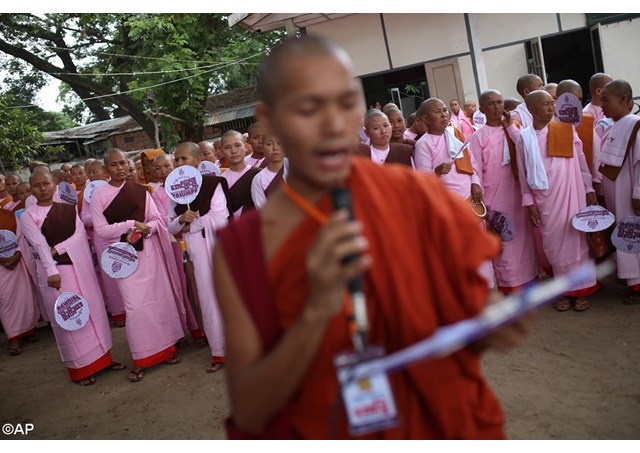
Myanmar Hardline Buddhists celebrate religion laws as a 'victory'

(Vatican Radio) Hardline Buddhists in Myanmar have launched nationwide rallies to celebrate a set of controversial laws on race and religion. But leaders from minority faiths say it's another troubling sign of how religion is being used to sow conflict in a divided country.
Thousands of people, including monks and nuns, took to the streets of Mandalay on Sept. 21. Crowds shouted "Victorious! Victorious!" while marching in the country’s second-largest city.
The Sept. 14 gathering was the start of a two-week nationwide anti-Muslim event organized by Myanmar’s powerful Buddhist nationalist group, locally known as Ma Ba Tha. The cause for celebration was the recent adoption of a package of laws to “protect race and religion” in the Buddhist-majority country, further marginalizing its beleaguered Muslim minority.
Ashin Wirathu, a Ma Ba Tha member and outspoken monk known for his fiery speeches denouncing Muslims, addressed thousands of cheering supporters during the rally.
"We need race and religion laws to protect our Buddhist women from the Islamization of jihad," he said. "… We are now able to save our women through the legislation."
Wirathu and other hardline Buddhists had lobbied for the restrictive laws, sponsored by the Ma Ba Tha and signed into law last month by President Thein Sein. The race and religion laws include bills that impose mandatory "birth spacing" for women; monogamy laws that would punish people with more than one spouse; marriage laws that require Buddhist women to register their marriages in advance if marrying a man who is not Buddhist; and a law regulating religious conversions.
A Muslim man recently became the first target of the new monogamy law, facing seven years in prison for living with a Buddhist woman after separating from his wife.
Critics say the laws are a blatant attempt to target Myanmar’s Muslim minority and the often persecuted Muslim Rohingya group in particular.
Earlier this month, the government-backed election commission culled more than 100 candidates, most of them members of the Rohingya Muslim minority from western Myanmar. The commission cited concerns about their citizenship. Nearly 1 million Rohingya Muslims were stripped of their right to vote earlier this year after pressure from Buddhist nationalists.
The opposition National League for Democracy (NLD) party, led by Nobel Peace Prize laureate Aung San Suu Kyi, has increasingly found itself the target of the Ma Ba Tha.
“There are many parties and people who can bring the best reforms to Myanmar,” a monk told the audience at a Yangon monastery during the Sept. 14 gathering, reading a statement from Ma Ba Tha leader Ywarma Sayadaw. “It is extremely crucial to avoid and not to vote for those who claim they work for the people but look to abolish the race protection laws … and help those from other races and religions for money.”
In a separate speech that day, another nationalist monk, Maw Kyun Sayardaw, reportedly likened the opposition party to a “league of prawns” — an insult in Myanmar culture associated with stupidity.
Suu Kyi’s party — which is expected to win a landslide victory in the elections — has publicly criticized some of the race protection bills. That has provoked the ire of Buddhist nationalists, many of whom view Suu Kyi, a democracy icon who spent most of her life outside Myanmar, as too sympathetic to international interests.
In a statement published on Facebook on Sept. 15, nine embassies expressed concern “about the prospect of religion being used as a tool of division and conflict during the campaign season” in Myanmar. The government has rejected the allegations, accusing the signatories, including the U.S. government, of fomenting “misunderstanding and doubts” among the people.
U Ye Htut, the head of Myanmar’s Ministry of Information and Thein Sein’s spokesman, defended the Ma Ba Tha’s right to campaign for candidates perceived to support Buddhism.
Catholics and other faith leaders, however, see the legislation as a strike against pluralism in multiracial Myanmar.
Father Maurice Nyunt Wai, executive secretary of the Catholic Bishops' Conference of Myanmar, said the Ma Ba Tha celebrations are blurring the lines between religion and politics ahead of nationwide elections in November.
"We have much concern that religion is used for political purposes and things could become unstable ahead of Nov. 8 polls," Father Nyunt Wai told ucanews.com.
Aye Lwin, the chief convener of the Yangon-based Islamic Center of Myanmar, also expressed fears that the hardline monks were dividing the country based on faith.
"This is a well-planned and organized way to use religion as a political tool, especially targeting minority Muslims," Aye Lwin said.
There is broad distrust of Muslims among many in the Buddhist-majority country. Rohingya people in western Rakhine state bore the brunt of violence that erupted in 2012 between Rakhine Buddhists and Rohingya Muslims. Dozens of people were killed and tens of thousands were forced to flee their homes, the majority of them Rohingya.
While many critics believe the race and religion laws are targeting the Muslim community, some also fear that the legislation could have repercussions for other minority faiths, including Christians.
Timothy Muna Paul, president of the Seventh-day Adventist Church in Myanmar, said the marriage and religious conversion laws could be troublesome for Christians.
"I feel that the religion laws could affect minority Christians in the country," Muna Paul said.
Previously, Cardinal Charles Maung Bo of Yangon condemned the legislation, calling the laws the product of "hatred."
"Any effort to dilute the pristine image of Buddhism and its message of universal love needs to be resisted by all people of our nation," he said in a Sept. 10 statement urging Myanmar’s leaders to review the laws.
(UCANews, Al Jazeera)
| All the contents on this site are copyrighted ©. |


